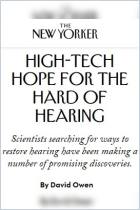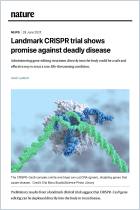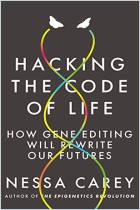
Gene Therapy Tackles a Common Birth Defect: Deafness
After false starts, researchers are making progress toward treating deafness with gene therapy
Recommendation
In 1999, an 18-year-old named Jesse Gelsinger tried an experimental therapy to treat his liver disorder. Using a virus as a vehicle, doctors at the University of Pennsylvania transported healthy genes into his DNA in an effort to rewrite faulty genetic programming. Gelsinger’s immune system responded by launching a violent offensive against his own organs. He died soon after. This wasn’t an auspicious beginning for gene therapy, but after 20 years of fine-tuning, scientists are now seeing success. Dina Fine Maron describes the hopeful results of animal trials in this Scientific American article which will fascinate anyone concerned with the future of gene therapy.
Summary
About the Author
Dina Fine Maron, formerly an associate editor at Scientific American, is now a wildlife trade investigative reporter at National Geographic.
















Comment on this summary or Diskussion beginnen